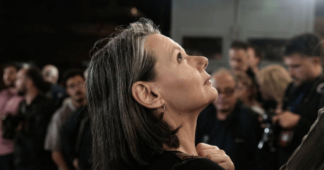By Christos Marsellos
Despite the tragicomic quality it has assumed (the emphasis on the comic or tragic element being a matter of temperament), or perhaps because of it, the dispute over the next leadership of the party of the more or less, in substance or in name, “radical” left in Greece has, through a succession of ever new episodes, an instructive character that goes beyond the merely Greek confines.
The facts: The campaign of the succession of Alexis Tsipras was well underway, between four candidates vying for the leadership of Syriza, when a fifth candidate suddenly appeared, out of the blue, one might say: Stefanos Kasselakis, age 35. A silver medalist in a mathematics competition when he was 14, who followed, successfully one must think, finance and international studies on a scholarship in the US, Kasselakis, not insignificantly, had worked on a voluntary basis for Joe Biden’s 2008 election campaign and for the CSIS (Center for Strategic and International Studies) foreign policy think tank, before being employed, professionally this time, by Goldmann Sachs; at the age of 26 he started a business career in the shipping industry, and recently, not satisfied with his various accomplishments, he felt that he should run for the leadership of Syriza, whose state ballot he had joined, in a non-elected position, in 2023, as a representative of the Greek expatriate community in the States.
In the leadership contest he has the support of one of the admittedly most vociferous Syriza MPs (who, at some point was almost expelled from the party for his lack of restraint), Pavlos Polakis; which is at first glance quite paradoxical, given that their political references do not really seem to intersect anywhere.
Under these circumstances, some, like Polakis, see in the young and successful new candidate a unique possibility to break the monopoly of the Right (which recently won a repeat election and a 41% of the electorate) while others emphasize the ideological oddity of his candidacy. Is Kasselakis the left’s chance to modernize, or the Trojan horse to its final capture? His work for Biden and the CSIC inevitably creates the suspicion in many minds that he is “planted”; he replies that the only one who planted him in politics is Alexis Tsipras – even though the question as to who presented him to Tsipras does not seem to have been given a clear answer. Regardless of that, the youngman’s volunteer work is perhaps only indicative of his ambitions. If these ambitions are compatible with the Left, that is another question; this one he could not possibly avoid.
It will be difficult for the proponents of the view that Kasselakis is the only candidate capable of bringing the party back to life to avoid being accused of opportunism: do they not want victory at all costs, whatever this victory may be, even if it is the victory of a Left which is left only in name? Those who think he is a plant will surely be accused of being prone to conspiracy theories: don’t they see foreign agents everywhere?
The contrast seems absolute, but only at this low level of discussion. There is however a second level, which already touches on political evaluation. First of all, one cannot but concede the fact that the dispute between the more “traditional” candidates of the left did not seem to move the wider society – leaving room for the idea that a new, modernised left was needed for this. A cleavage between purists of the Left and modernizers who leered at the Center to widen the party’s electoral basis already existed ; Kasselakis’ renewed ‘left’ as expressed by a man whose record in no way indicates any connection to the Left, gave at first the impression of relegating all this discussion to antiquity; his Left would be a Greek version of the American Democratic Party with an emphasis on claiming rights– the fact that Kasselakis lives within a same-sex marriage becoming a type of proof of his being a man of our times. So, whether Stefanos Kasselakis is a plant or not, he may accelerate a division of Syriza in two components, weakening it rather than reinforcing it, as he claims.
There is more, even for those not particularly interested in the fate of Syriza. The projected ‘promising’ transformation of the left raises some formidable questions in the eyes of those who dread the path leading from social to societal questions and to the confinement of the Left in the latter. They could not fail to react to what they see as a capture of left ideology by the liberal Empire. The imperial ideology, because it is supposed to be pluralistic, must create a semblance of pluralism, as long as this pluralism is under control. The Empire has its Right and its Left, which precisely do not question its essence and aims. Any other “Right” is accused of being nostalgic of Hitler, and any other “Left” of being nostalgic of Stalin – or at least of being merely backward, out of time, etc. This is the hard core that cannot be touched. Flexibility can be shown in more peripheral matters. The new “Left” may be, for example, in favour of private universities, but if this view is not electorally advantageous it can be withdrawn. Some of the party’s preferences must be maintained, losing contact to the party’s base would defeat the purpose. Our candidate, who until recently expressed his appreciation for Prime Minister Mitsotakis, has lately used every degrading term imaginable to describe him, explaining that he sums up the corrupt system that forced him to leave Greece and seek his fortune in America. Most recently he visited Makronisos, a place of exile that has become a symbol for the Greek left, and gave there a fiery speech that made even hardliners feel uncomfortable regarding the appropriateness of its use in the campaign. (Tsakalotos, the most ideologically oriented among the other candidates felt he had to offer excuses on behalf of the party. P. Bassakos, a university professor, thought Kasselakis managed in record time to desecrate both the civil war and Makronisos) . This twirling inevitably gives the impression to many that Kasselakis is ready to do and say anything that will help him with the election. In so doing, he is not, of course, an exception. For decades now, instead of leading, our so-called leaders keep following the electorate’s wishes, as expressed in all sorts of polls. They pretend this is a more democratic way to govern, when in fact it is a not so democratic ruse to win elections. The result is a profound perversion of the electoral process, a prostitution of all convictions and beliefs, in the course of which the old question: what does it mean to be “planted”? arises with a new aura of quasi-philosophical ambiguity.
Many of those who believe that their careers are due to their talent may be able to recall the moment when they were offered some “spontaneous” help. What could be more natural than accepting some help from those who “recognized” their talents? But if one is capable of seeing what this “recognition” inititates, namely manipulation, which has no better ally than vanity, then he may wonder which came first, the “recognition” of a talent, or the search of an ambition malleable enough to be adapted to purposes that are not the ones, sometimes not even closely, purportedly served; vanity is a make-believe, readily supplanted by excuses when one starts to adjust his positions to ‘electoral needs’ – not to mention the least about the needs of those who sponsor him.
Of course, if vanity is natural, all of this is natural; it is not a “conspiracy”. Vanity exists at all times. Nevertheless, societies of the past used to make warriors of the young people, and politicians of the old. Ambition had to prove itself and by the time it did, it had almost certainly turned to sagacity. It had to be tamed, and societies relied on the wisdom of the older, and on their experience, to temper the momentum of the younger. Our warriors, on the other hand, are mostly traders and financiers, and traders and financiers they will likely remain till their old age; and sometimes they are politicians and they do the biddings of traders and financiers. That’s how we come to Young Leaders being a worldwide exclusivity of the European Continent. Neither the US, who seems to suffer from the opposite problem, nor the rest of the world, whose leaders are usually of a respectable age, come close to the profusion of Young Leaders in Europe. They are chosen, educated and sponsored by traders and financiers. And they sell out everything without any remorse of conscience, sometimes, maybe even most of the times, without even realizing what they are doing.
Our Young Leaders are in reality Golden Boys. What is there then to stop Golden Boys from becoming Young Leaders? It is Kasselakis’ time. Is it astonishing if the periphery shows the way in that matter? A few years ago, a Greek journalist who had taken a post as a politician was asked if he had been helped by some family connections. He answered honestly, and dismissively: I looked at the others and thought: why not me? A lot of people would say that, and they’re ready to make a career out of it. ‘Where’ is a secondary matter. Wherever they are given the chance. Stefanos Kasselakis has his chance through Syriza. He may well think: And why not? Are the others any better? He can even tell himself that if he succeeds, he will achieve something good and so justify the voters’ choice. He may even be right, insofar as most of the people he sees around him have the same criteria, whether they are planted in politics or have come out of the classic party process. Our age, an age of information rather than thought, which replaces truth with efficiency, tends to believe that the only necessary qualification is intelligence — and what is more intelligent than to follow science? So intelligence is mostly needed to gain the elections; the rest will be done by knowledgeable employees. Other eras have known other qualities — they knew, for example, that vanity can be a hindrance; not ours.
With no offense to the conspiracy theory trackers, the neutralisation of all convictions and beliefs is pursued today in a very methodical way. It is the case, for example, of the nomination of the party candidates, the newest form of which was introduced to Syriza by Alexis Tsipras, in a complete unawareness of the consequences to be had. Isn’t it all the more democratic, if, instead of the party members, it is the people who decides? Now, which people are we talking of? Well, the voters of the party, certainly, only we don’t know them, not before the elections, since they have not voted yet, not after, since the election is secret. How are we to distinguish them from others then? Well, let’s say they will be the ones willing to pay a fee in order to vote. But this fee cannot be very significant, for that would not be democratic. Result: by paying two euros anyone can vote. Let’s face it then: the leader of a party can be elected by supporters other than those of the party1 (under some critical mass of a party they can even be a majority)! It is important to understand how this was made possible, what the underlying presuppositions are. The word “party” itself underlined the discontinuity as a characteristic of the electoral body, it is a word belonging to another era. There are no parts in our “liquid times”, only hydraulic pressures to be managed; imperial ideology wants continuity and for continuity’s sake it has to liquidate everything. In this context parties are no longer parties, they are variables of adjustment. In the process, liberal democracy first ceases to be a democracy, and manages to be liberal only as long as it can export illiberalism at the periphery of the Empire and blackmail its constituents to conformity. It is a totalitarianism that does not speak its name and that hides its face.
What is most annoying is the feeling that all this does not concern only our so called leaders. Arnaud Montebourg, a former Minister of the socialist government in France, says that to understand our era we must once more engage in reading La Boétie: De la servitude volontaire. There was a time when it was supposed to be normal for young people to be rebellious and as they grew older to come to terms with reality. Perhaps we should see that the mechanism behind today’s reality is the exact opposite, and in fact perhaps what it has always been throughout history: young people who have their whole life ahead of them are possessed by the desire to achieve it and cannot do so without the recognition of others; this ambition ties the desire for distinction to the chariot of conformism: they are most easily manipulated by those who define the spirit of the times. Older people, who see beyond their own lives, are more open to a sense of duty; they don’t make for malleable politicians then, they are the ones who can be the true revolutionaries. If they are sacrificed today to the cult of youth, the reason is they are the most dreaded by our Young Leaders and by their sponsors.
1 Readers of Greek can refer to two articles by Dimitris Konstantakopoulos: Από την Goldman Sachs στον Τσίπρα: Το πραξικόπημα στον ΣΥΡΙΖΑ | ΔΗΜΗΤΡΗΣ ΚΩΝΣΤΑΝΤΑΚΟΠΟΥΛΟΣ (konstantakopoulos.gr) and Έγκλημα: Οι Αμερικανοί αρπάζουν τον ΣΥΡΙΖΑ με τη βοήθεια του Τσίπρα !!! (και οι παρένθετες μητέρες) | ΔΗΜΗΤΡΗΣ ΚΩΝΣΤΑΝΤΑΚΟΠΟΥΛΟΣ (konstantakopoulos.gr) and one by Themis Tzimas : Η γελοιότητα ως όπλο της εξουσίας | Κοσμοδρόμιο (kosmodromio.gr)
Also read
Six war mongering think tanks and the military contractors that fund them
Americans and Goldman Sachs kidnap SYRIZA with the help of Alexis Tsipras!
We remind our readers that publication of articles on our site does not mean that we agree with what is written. Our policy is to publish anything which we consider of interest, so as to assist our readers in forming their opinions. Sometimes we even publish articles with which we totally disagree, since we believe it is important for our readers to be informed on as wide a spectrum of views as possible.











